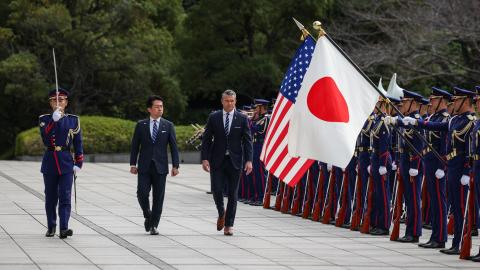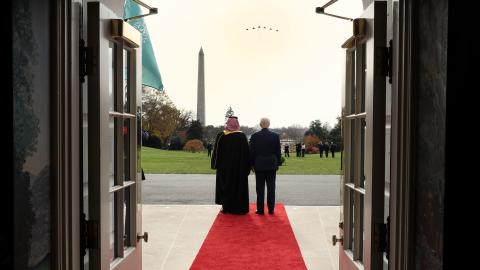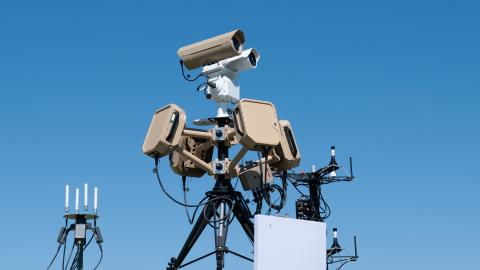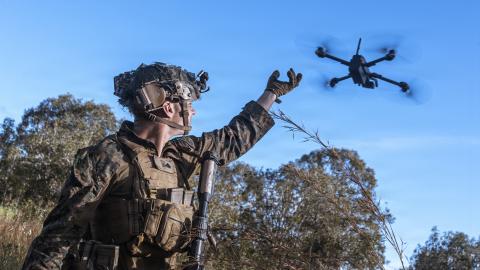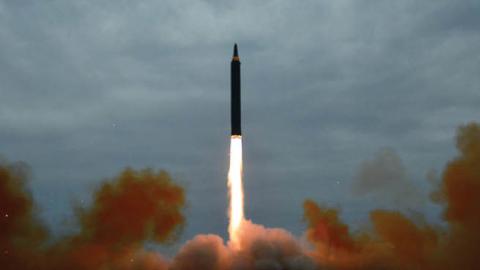To successfully maintain the relative peace the United States has enjoyed for decades, the United States must consider what would convince adversaries that we would make them regret attacking a vital interest. Thus, deterrence is an art, not a science, and it requires a clear-eyed assessment of a variety of ever-changing factors that will vary from one country's leaders to the next. An ideological objection to nuclear weapons themselves and an idealists' policy agenda, could result in actions that tempt the very thing anti-nuclear idealists want to avoid - a nuclear exchange.
Last week, the head of United States Strategic Command Admiral Charles Richard, testified before a Senate panel. He warned, "For the first time in our history, the nation is facing two nuclear-capable strategic peer adversaries at the same time, both of whom have to be deterred differently. Chinese and Russian advances are eroding our conventional and strategic deterrence."
Regarding the Chinese, he said, "They are well ahead of the pace to double their stockpile by the end of the decade. And I further submit that the size of a nation's weapon stockpile, by itself, is a very crude measure of what they can do with that capability." He went on to describe the various ways China is improving its nuclear forces and said, "By these measures, China is capable of executing any plausible nuclear employment strategy regionally now and will soon be able to do so at intercontinental ranges."
On the issue of Russia, he said, "It is easier to describe what they're not modernizing, nothing, than what they are, which is pretty much everything, including several never-before-seen capabilities and several thousand non treaty accountable weapon systems."
On the campaign trail, Biden criticized the investments of the last administration in the nuclear deterrent and in strategy adaptations. His administration has stated its aim to "take steps to reduce the role of nuclear weapons in our national security strategy." But the necessary review of the threats and the nuclear deterrent is underway.
But in an important exchange with Richard, Senator Tom Cotton pointed out that two Biden political appointees have already indicated to foreign press that the United States is considering changes to our policy and posture. Cotton said he was "concerned that low level political appointees" at the Pentagon may be subverting the integrity of the review by Defense Secretary Lloyd Austin.
Cotton said, "Those political appointees gave an interview in Japanese media implying the reduction of funding for our nuclear forces and perhaps even the enactment of a sole purpose nuclear policy. Neither of those appointees have been confirmed by the Senate. Were either you or Secretary Austin consulted before they made these public comments?"
Richard confirmed that nobody at Strategic Command had been consulted. When Cotton pressed, "Do you believe it would be in the best interest of our nation to go to a sole purpose nuclear policy?" Richard said he did not and that doing so would "remove a level of ambiguity that has had useful deterrent value to us."
Senator Elizabeth Warren scolded him saying, "So now it is your job to provide input and to recommend options to the president and the secretary if you are asked, but that doesn't mean making public comments to try to box in the president's decision-making." But reality and the national objectives of our enemies have a way of "boxing in" the president's options. Perhaps Warren should direct her ire at the Chinese Communist Party and the Russian Federation.
The exchanges reveal a central problem with the nuclear idealists that tend to reside on the left side of the political spectrum. The desire to scale back or limit options for our nuclear forces, whether that be regarding testing or employment, drives their agenda. But if maintaining a robust deterrent based on the varied threats drives the strategy, policymakers could very well rightfully conclude that modernizing our nuclear force, and even growing it or adding other kinds of delivery systems, maintaining a broad spectrum of options for employment and nuclear testing, could maximize the credibility of our deterrent and therefore increase our chances of preserving the peace.
The desire to cut or weaken our nuclear forces seemingly implied in the interview with the two nominees and in Warren's statement could have the unintended consequences of increasing the likelihood of the crises we want to avoid. Congress should heed Richard's warnings and fully modernize the nuclear deterrent, which at its high-water mark is still less than 7 percent of the defense budget. The administration must adopt policies and strategies that would further complicate the adversaries' calculations, not simplify them. The risks of nuclear employment continue to rise and so our national commitment to maintain the most credible deterrent force must hold.
Read in The Hill
